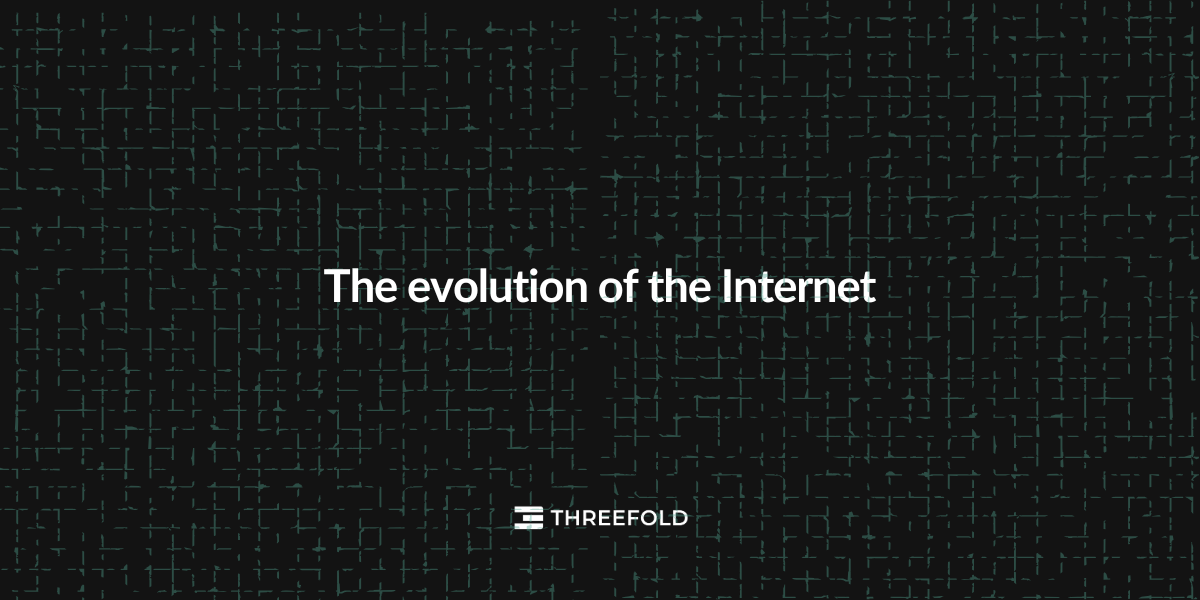The Evolution of the Internet: From Free to Controlled, and Back Again
Explore the internet's evolution from a decentralized network to a controlled system, and the emerging movement to reclaim its original vision through ThreeFold.

The internet has undergone a remarkable transformation since its inception in the 1960s. What started as a small, decentralized network designed for sharing knowledge and fostering collaboration has evolved into a vast, complex system that influences almost every aspect of modern life. However, this journey has been marked by significant shifts in the structure and nature of the internet, leading us to a critical juncture today.
🔗The Birth of the Internet
In the 1960s, the internet was born from a simple yet revolutionary idea—a peer-to-peer network that allowed researchers and institutions to connect and share information freely. This early version of the internet was decentralized, with no central authority controlling the data flow. It was a place where collaboration and open communication flourished, laying the groundwork for a digital world built on trust and transparency. The internet was seen as a tool for empowering individuals and fostering a global exchange of ideas, embodying a vision of a free and open digital space.
🔗The Internet Changes
As the internet expanded throughout the 2000s, it became a global phenomenon, with millions of users coming online and businesses quickly recognizing its potential. However, this rapid growth came at a cost. The internet, once a bastion of free and open communication, began to be dominated by commercial interests. Companies saw the vast potential for profit in the digital world and began to exert control over the internet’s infrastructure and the data flowing through it.
This shift toward commercialization led to a more centralized and controlled version of the internet. The original spirit of the internet—one of trust, openness, and decentralized collaboration—started to fade. User data became a valuable commodity, often exploited for profit, and the internet grew increasingly insecure. The once-free and collaborative space became a battleground for control, and the idea of a decentralized internet seemed to be slipping away.
🔗A New Era for the Internet
Today, in 2024, we find ourselves at a pivotal moment in the history of the internet. While it has become an essential part of our lives, the current model is not sustainable. Issues like data privacy, security, and the environmental impact of massive data centers have highlighted the need for change.
In response to these challenges, a new vision for the internet is emerging—one that seeks to restore the principles of sovereignty, security, and sustainability. This vision is being realized by developing ultra-secure, green, scalable, and user-friendly autonomous cloud technologies. These innovations aim to create a more sovereign internet, where users have control over their data and where the infrastructure is more environmentally responsible.
The goal is to return to the original ideals of the internet—open-sourced and decentralized—but with the added benefits of modern technology. By embracing these new technologies and renewing our commitment to decentralization and openness, we can create a better, more secure internet for everyone.
🔗Redefining the Internet: ThreeFold’s Path to Change
The internet’s evolution from a modest, collaborative network to a global powerhouse has been revolutionary, yet this growth has come at a cost. Originally built on principles of openness, decentralization, and the free exchange of information, the internet has increasingly become centralized, commercialized, and fraught with privacy and security concerns. Today, despite its immense power, the internet has strayed from the visionary ideals that once guided its creation. However, there is a growing movement to reclaim the internet’s original promise. By revisiting these foundational principles and embracing new technologies, we have the opportunity to build a digital world that is secure, sustainable, and true to the vision of a free and open internet.
This is where ThreeFold comes in. ThreeFold is pioneering a fundamental shift in how we approach the internet and cloud infrastructure. By building from the ground up, ThreeFold is creating a decentralized autonomous cloud that is truly transformative. Unlike traditional cloud services, which are often centralized and controlled by a few major players, ThreeFold’s infrastructure is distributed across a network of 3Nodes—hardware deployed locally by individuals and communities worldwide.
This decentralized approach offers significant benefits: it enhances security by reducing single points of failure, lowers costs by leveraging local resources, increases energy efficiency by processing data closer to the source, and provides unmatched scalability to meet global demand. By empowering individuals to contribute to and benefit from this network, ThreeFold is helping to create a sovereign internet—one that is owned by the people, for the people.
ThreeFold’s vision goes beyond technology: it’s about returning to the core values that once defined the internet. By fostering genuine collaboration, respecting privacy, and ensuring that the internet remains open and accessible to all, ThreeFold is helping to usher in a new era. In this era, the internet will not only connect us but also empower us, enabling a more equitable, secure, and sustainable digital future.

